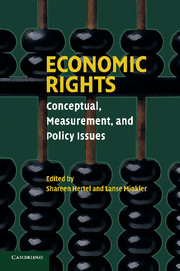Book contents
- Frontmatter
- Contents
- Contributors
- Acknowledgments
- 1 Economic Rights: The Terrain
- SECTION I CONCEPTS
- 2 The West and Economic Rights
- 3 Needs-Based Approach to Social and Economic Rights
- 4 Economic Rights in the Knowledge Economy: An Instrumental Justification
- 5 “None So Poor That He Is Compelled to Sell Himself”: Democracy, Subsistence, and Basic Income
- 6 Benchmarking the Right to Work
- SECTION II MEASUREMENT
- SECTION III POLICY ISSUES
- APPENDIX 1 Universal Declaration of Human Rights
- APPENDIX 2 International Covenant on Economic, Social, and Cultural Rights
- Index
- References
5 - “None So Poor That He Is Compelled to Sell Himself”: Democracy, Subsistence, and Basic Income
Published online by Cambridge University Press: 18 December 2009
- Frontmatter
- Contents
- Contributors
- Acknowledgments
- 1 Economic Rights: The Terrain
- SECTION I CONCEPTS
- 2 The West and Economic Rights
- 3 Needs-Based Approach to Social and Economic Rights
- 4 Economic Rights in the Knowledge Economy: An Instrumental Justification
- 5 “None So Poor That He Is Compelled to Sell Himself”: Democracy, Subsistence, and Basic Income
- 6 Benchmarking the Right to Work
- SECTION II MEASUREMENT
- SECTION III POLICY ISSUES
- APPENDIX 1 Universal Declaration of Human Rights
- APPENDIX 2 International Covenant on Economic, Social, and Cultural Rights
- Index
- References
Summary
Critics have long denigrated economic rights, viewing them as less coherent, less important, and less defensible than traditional civil and political rights. Despite their inclusion in the Universal Declaration of Human Rights (UDHR) and their articulation in the International Covenant on Economic, Social, and Cultural Rights (ICESCR), the critics insist that the content of economic rights, their nature, and their relationship with other rights remain inadequately theorized. Moreover, persistent philosophical doubts – including objections to the alleged “positive” character of economic rights, questions about the purported interdependence and indivisibility of human rights, worries about the specificity of the obligations arising in connection with economic rights, and fears about the illimitable character of those obligations – render economic rights conceptually wobbly and politically precarious. It is true that theorists of social justice generally eschew rights-based approaches, though activists and advocates increasingly adopt the language of human rights in making their demands. And whether we attribute skepticism toward economic rights as primarily ideological or sincerely conceptual, there is no debating that economic rights remain “in question” in a way civil and political rights do not. In an era of rapid and profound social and economic transformation, and in a political context in which human rights are emerging as the dominant transnational normative discourse, it is urgent that we revisit the conceptual foundations of economic rights: the lack of theoretically sound and politically persuasive arguments for economic rights jeopardizes efforts to build momentum for humane, sustainable, and democratic economic priorities.
- Type
- Chapter
- Information
- Economic RightsConceptual, Measurement, and Policy Issues, pp. 94 - 114Publisher: Cambridge University PressPrint publication year: 2007
References
- 3
- Cited by



